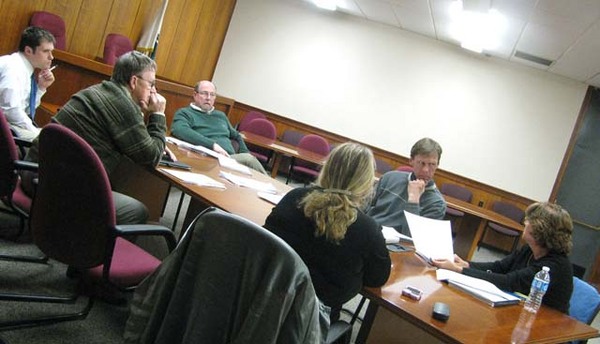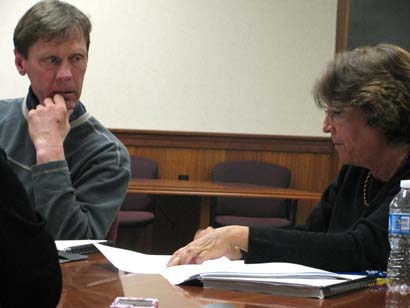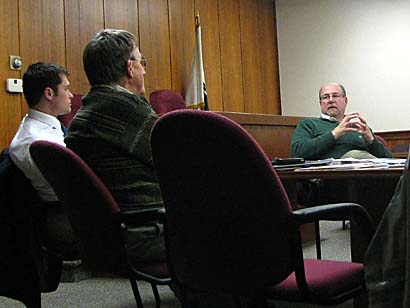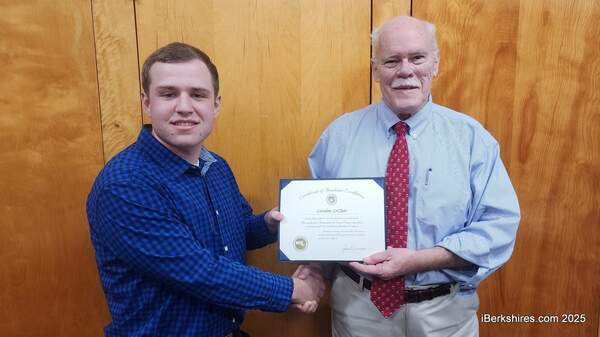
North Adams Finance Committee Questions Landfill Fee
 Finance Committee Chairman Michael Bloom asks a question of Business Manager Nancy Ziter. |
The City Council had authorized the increase in an ordinance change but the $4 increase, up from $80, was apparently put on hold because of a drop off in haulers. But the council subcommittee charged with finding new revenues was surprised to find one source wasn't even being used.
"The transfer station averages 450 tons per week; that's nearly $2,000 a week in revenue," said Chairman Michael Bloom. "The landfill is a huge expense but it's also a huge income."
More truckers were taking their trash to the privately run Pittsfield operation and the drop off was enough for the former administration not to hasten their departure, said Business Manager Nancy Ziter, "If you look back a few years ago you can see it's dropped off."
Bloom wasn't convinced that the Pittsfield facility's flexibility with pricing was undercutting the city landfill. The ripple effect from the recession had slowed construction, renovations and purchasing, all of which had an affect on the amount of material coming into landfill, he said.
"I don't think that $4 per ton is going to beat them up that bad," said Bloom, who urged immediate action. "I don't want to lose any teachers or firefighters, let's go."
The review of landfill operations is just one of the many areas the new administration is turning a bright light on as it seeks new revenue and ways to cut costs. Getting a handle on the city's finances is imperative as the state eyes a 4 percent cut in municipal aid for the coming year — just the latest in budgetary belt-tightening that's left cities and towns pinching pennies.
The cuts could mean a loss of $800,000 to the city; North Adams also used about $1.3 million in reserve funds to balance its budget this year, and Mayor Richard Alcombright, who attended the meeting, said he doesn't want to dip into those types of accounts again.
"In the best possible case, we could find $3 million potential revenue sources," he said, including $900,000 in new growth and the meals tax.
The .75 percent meals tax passed by the state last year, and added to the state's new 6.25 percent sales tax, would add 7 percent onto the cost of the meal. That less than a penny tax would go straight back to the city for an estimated $72,000 a year, however, as does the rooms tax that brought in $92,000 since its adoption last fall.
"If you spent a $1,000 eating out it's going to cost you $7.50 a year," said Alcombright. "It's that the $50 dinner with my wife is an extra 30 cents."
 Mayor Richard Alcombright, right, talks with Councilors David Bond and Alan Marden. |
The committee is awaiting confirmation of the figures in a report prepared by the administration on high commercial users of the city's septic system to look at trends and continue discussions on implementing a user fee. Nearly 5,000 homes are connected to the septic system.
The septic, part of the Hoosac Water Quality District, currently brings in about $300,000 a year through payments from Clarksburg, Northern Berkshire Healthcare and Massachusetts College of Liberal Arts. Clarksburg contracts with the city to accept waste-water from users hooked into the city line; the two nonprofits pay 100 percent of their waste-water bills in lieu of taxes.
A discussion on costs at the Historic Vally Campground was delayed until the new Windsor Lake commissioners could be appointed they could join in a review its budget. The committee also wants to look at the costs of the many buildings the city owns, although some lie within separate authorities, such as Western Gateway Heritage State Park.
Such entities are supposed to be self-supporting. "Do we know that?" asked committee member Councilor David Bond. Alcombright said later that such "off-budget" items would begin to be documented in the next budget cycle.
The mayor and Ziter also told the committee:
► That the city currently has about $700,000 in Chapter 90 funds, part of which is targeted over the next five years to complying with Americans with Disabilities Act curb cuts for the federally-funded streetscape project.
► A $120,000 borrowing authorization will be used toward capital equipment purchases, including a fire truck being evaluated by Fire Director Stephen Meranti.
► An annual 911 state grant, funded through taxes on Verizon, will be used to hire two new police officers. The force is down four officers at the moment as two are at the academy and two are overseas.
Alcombright said he will meeting with his executive committee and department heads this week and that the review of coming budget will be "meticulous."
"We're going to get very specific as to every single position within their departments, and when they say 'salary,' that's exactly what their salaries are; when we say 'expenses,' that's what we're projecting," said Alcombright. "We're also going to allow them to express their needs for capital."
Those findings, plus historical records from the past few years, will be provided to the Finance Committee and the full City Council. A complete budget — or as complete as possible pending state figures — should be ready by the end of May.
Alcombright vowed transparency in his campaign for mayor; he's sticking to that by planning at least two public presentations of the city budget this spring.
As for the landfill rate hike, a reluctant Bloom agreed with committee members Bond and Alan Marden to set it aside for a couple weeks to see if the city could legally enact a more flexible, sliding fee schedule.
The committee will next meet Monday, March 29, at 4 p.m.















